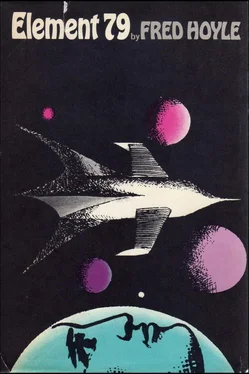“How could there be?”
“The situation’s a bit complicated. Here, take a look at this.”
Carruthers handed me a typewritten list. It covered a week of television programs. If this represented viewing by the animals, the set must have been switched on more or less continuously. The programs were all of one type, sports, Westerns, suspense plays, films of violence.
“What they love,” said Gussie by way of explanation, “is the sight of humans bashing themselves to pieces. Really, of course, it’s more or less the usual popular taste, only a bit more so.”
I noticed the name of a well-known rating firm on the letterhead.
“What’s this heading here? I mean, what’s all this to do with the T.V. ratings?”
Gussie fizzed and crackled like a soda siphon. “That’s exactly the point. This house here is one of the odd few hundreds used in compiling the weekly ratings. That’s why I asked if there was anything wrong in Bingo doing the switching.”
“You don’t mean viewing by those animals is going into the ratings?”
“Not only here, but in three other houses I’ve bought. I’ve got a team of chaps in each of them. Bears take quite naturally to the switching business.”
“There’ll be merry hell to pay if it comes out. Can’t you see what the papers will make of it?”
“Very clearly, indeed.”
The point hit me at last. Gussie could hardly have come on four houses by chance, all of which just happened to be hooked up to the T.V. rating-system. As far as I could see, there wasn’t anything illegal in what he’d done, so long as he didn’t make any threats or demands. As if he read my thoughts, he pushed a slip of paper under my nose. It was a check for fifty thousand pounds.
“Unsolicited,” he wheezed, “came out of the blue. From somebody in the advertising game, I suppose. Hush money. The problem is, do I put myself in the wrong if I cash it?”
Before I could form an opinion on this tricky question, there came a tinkling of breaking glass. “Another one gone,” Gussie muttered. “I haven’t been able to teach Bingo to use the vertical or horizontal holds. Whenever anything goes wrong, or the program goes off for a minute, he hammers away at the thing. It’s always the tube that goes.”
“It must be a costly business.”
“Averages about a dozen a week. I always keep a spare set ready. Be a good fellow and give me a hand with it. They’ll get pretty shirty if we don’t move smartly.”
We lifted what seemed like a brand-new set from out of a cupboard. Each gripping an end of it, we edged our way to the television snuggery. From inside, I was now aware of a strident uproar, compounded from the bark of a dog, the grunt of a bear, and the shrill moan of a red-headed cat. It was the uproar of animals suddenly denied their intellectual pabulum.
The cosmic powers, the inner powers, you understand, like a good lotus-eater when they see one. They had some rare beauties on their hands now. Yet the inner powers do not like breaking the natural order of things too flagrantly, although they’re not above slipping in what mathematicians are pleased to call a perturbation. This time they were willing to interfere to the extent of slipping in a chip of rock the size of a pea.
Some four and a half billion years ago the inner planets were formed by condensation in a gas cloud that quitted the Sun for dynamical reasons. The gas was pushed further and further away. As it moved outward, solid and liquid particles were formed, common refractory materials first, then less common, less refractory materials. Innermost were common metals and rock, composed mainly of elements 8, 12, 14, and 26—iron, that is to say, and the oxides of magnesium and silicon.
Element 79 is almost as refractory as iron, but it was present in the gas in very much smaller quantity. The vapor pressure was much much lower than the vapor pressure of iron. So element 79 didn’t condense until the gases moved considerably further away from the Sun. Whereas the ordinary metals and the rock were precipitated mainly in the region of Venus and Earth, element 79 did not condense until the gases reached the region between Mars and Jupiter. In fact, element 79 was precipitated in the asteroidal belt. A thermodynamic calculation will show how very sensitive the condensation process was to distance from the Sun. ( Nota bene: Because of the very small vapor pressure, the temperature had to be rather low, about 750K, compared to 1500K for iron. This meant that the well-known exponential factor involving the binding energy of the atoms into the solid crystal lattice was a very large number, the factor of the form exp(−Q/kT) . This, in turn, meant the condensation was very temperature-sensitive, and hence sensitive to distance from the Sun.)
The significance of these technicalities is that condensation of element 79 was a quite critical process. Scarcely any of it condensed before the gases reached a certain distance, actually 2.257… A.U., then all of it suddenly dropped out of the vapor into solid objects, which were of almost pure element 79. The objects were mostly about one or two tenths of a kilometer in radius and there were about a thousand of them. It was on these objects that the cosmic powers, the inner powers, concentrated their attention for a brief instant.
What they intended was to bring one of the objects close to Mars at exactly the right place and time. It was natural to choose the particular object that came nearest to fulfilling their requirements in the ordinary way of things. Then a calculation was performed in the following way. All the particles in the asteroidal belt were numbered. There were many millions of them. Then quantities I(r/s/t/…) were worked out for all combinations of values of r, s, t, … . The meaning of these quantities was quite simple. For instance, by I(r/s/t) is meant the impulse that had to be given to the r th asteroidal particle in order for it to hit the s th particle, which in turn would hit the t th particle, which in turn would hit the required object in exactly the right way to bring it near to Mars at the right time and place. By I(r/s/t/u) is similarly meant the impulse that had to be given to the r th particle in order for it to hit the s th particle, in order for it to hit the t th particle, in order for it to hit the u th particle, which would then hit the required object in exactly the required way. Similarly, too, for still more complicated combinations, like I(r/s/t/u/u) . In this game of cosmic billiards the calculations were kept going until an impulse was obtained that could be achieved by placing the prescribed chip of rock the size of a pea at a precisely defined spot at a precisely defined time. It will be clear that the calculations had to be done not only for all combinations of the asteroidal particles but for different moments of time. This was why the sheer volume of the calculations was far beyond human capability.
The fateful chip of rock was slipped into position. A meteorite a foot in diameter hit it a glancing blow. The resulting modification in the orbit of the meteorite was quite minute. Yet by the end of the year it was sufficient to change the position of the meteorite by more than fifty miles, sufficient to cause it to hit, slap-bang, another meteorite, this time about ten yards in diameter. The same pattern was repeated for a whole chain of particles until at last a rather large one plugged its way into the object composed of essentially pure element 79.
The perihelion distance of the object—its closest distance to the Sun, that is to say—was now almost exactly the same as the mean radius of the orbit of Mars. In the ordinary way of things, a close approach between the object and Mars was to be expected sooner or later. The approach came sooner, because the calculations had been exactly performed. The approach was close, the object almost shaved the surface of Mars. It approached Mars more or less along the line of the motion of Mars about the Sun, and its speed of approach relative to the planet was a little less than 2.3 kilometers per second.
Читать дальше












